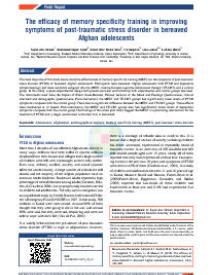The efficacy of memory specificity training in improving symptoms of post-traumatic stress disorder in bereaved Afghan adolescents
The main objective of this study was to study the effectiveness of memory specificity training (MEST) on the symptoms of post-traumatic stress disorder (PTSD) of bereaved Afghan adolescents. Participants were bereaved Afghan adolescents with PTSD and depressive symptomatology and were randomly assigned into the MEST, trauma-focused cognitive behavioural therapy (TF-CBT) and a control group. In this study, a quasi-experimental design with pretest–post-test and follow-up with experimental and control groups was used.
The instruments used were the Impact of Event Scale-Revised, Persian versions of the Mood and Feelings Questionnaire, clinical interview and demographic questionnaire. Post-intervention, the MEST and TF-CBT groups had significantly lower levels of PTSD symptoms compared with the control group. There was no significant difference between the MEST and TF-CBT groups. These effects were maintained at 12 weeks. Post-intervention, the MEST and TF-CBT groups also had significantly lower levels of depression symptoms compared with the control group.The findings of this small pilot study suggest that MEST is a promising intervention for the treatment of PTSD and a larger randomized controlled trial is warranted.
In: Intervention: Journal of Mental Health and Psychosocial Support in Conflict Affected Areas, ISSN 1571-8883 | 16 | 3 | 243-248
http://doi.org/10.4103/INTV.INTV_37_18


